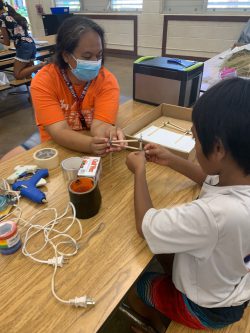Molokai Summer Mobile Learning Hub

Summer Mobile Learning Hub Teacher, Mapuana Dudoit, follows a student’s lead in a project-based learning environment at Kaunakakai School.
By Ric Ornellas
The Molokai Summer Learning Hub, a novel way to educate Molokai youth in Kindergarten through grade 12, completed its island-wide cycle in mid-July. The Learning Hub, a pilot for possible future distance learning in rural communities, was funded directly from the Hawaii Board of Education (BOE), created by the Department of Education (DOE) and Molokai public school principals, and managed overall by Alison Place, Complex Specialist. The Hub traveled weekly, in a DOE-provided van, to four school sites, Kilohana Elementary, Kaunakakai Elementary, Molokai High School, and Maunaloa Elementary meeting with principal- or teacher-recommended elementary-, middle-, and high-school students to provide opportunities for learning that the current COVID-19 pandemic might have prevented.
Curriculum varied, depending on student needs, with elementary students in grades two through six, and middle schoolers, grades seven and eight, focusing on a culture project honing reading, writing, math, speaking and listening skills. High schoolers worked on credit recovery in core subjects such as ELA, math, science, or social studies and selected electives. Elementary students met from 8:30 to 10:30 a.m. and high school students worked from 11 a.m. to 1 p.m. For safety, the teachers wore masks and practiced, as much as possible, social distancing. Students initially washed their hands with sanitizer and tables, chairs, and computers were routinely cleaned between sessions.
Elementary students, in their summer project, used literacy skills to learn new words on architecture; drew frames and simple blueprints, and used found-materials to build a Hawaiian hale incorporating both cultural and western learning. Each student chose to write a project reflection or poem or story. They met an additional learning challenge when they presented their project on video.
Onsite, high schoolers worked on laptops provided by the BOE. They were permitted to take laptops home to continue distance learning throughout the four-week cycle and into the near future. In addition, for students needing home internet access, online hotpots — called jetpacks — were loaned to students for continuous learning. Many students, in the newly acquired Acellus program, will continue credit recovery into August and possibly into the new school year, depending on their curriculum requirements.
These innovative projects demonstrate how hands-on learning can effectively engage students in meaningful ways. By incorporating literacy skills into their summer projects, elementary students not only expanded their vocabulary but also gained a deeper understanding of architecture and cultural heritage.
Furthermore, as students reflect on their experiences through writing—whether it be poetry, stories, or project reflections—they enhance their communication skills and learn to articulate their thoughts more clearly. Resources like Memrizz can aid in this process, allowing students to create flashcards that reinforce new vocabulary and concepts learned throughout the project.
As students review their flashcards, they reinforce their memory through spaced repetition, making it easier to recall information when needed. This method not only boosts confidence in their communication skills but also empowers students to express their ideas with greater clarity and precision in their writing.
Meanwhile, high school students benefitted from the flexibility of technology in their distance learning journey. The ability to take laptops home fosters independence and encourages students to take charge of their learning. With access to jetpacks for internet connectivity, students can engage with their coursework from virtually anywhere, ensuring they remain connected and supported throughout their education
The BOE provided the student supplies including all technology, art and cleaning supplies, tables, chairs, and pop-up tents for outside learning which students enjoyed.
Local Hub staff were School Site Coordinators Laura Peterson, Sara Jane Larkin and Kaho’iwai Kawa’a. Teachers traveling to all four schools were Teddy Sotelo, Ric Ornellas and Mapuana Dudoit, who coordinated extensive technology needs and site setup.
Additional high school student support was provided by 21st Century tutors, Ardis Farris and U’i Borden, who consistently contacted students to answer student questions on curriculum and assignment completion.











Don't have a Molokai Dispatch ID?
Sign up is easy. Sign up now
You must login to post a comment.
Lost Password